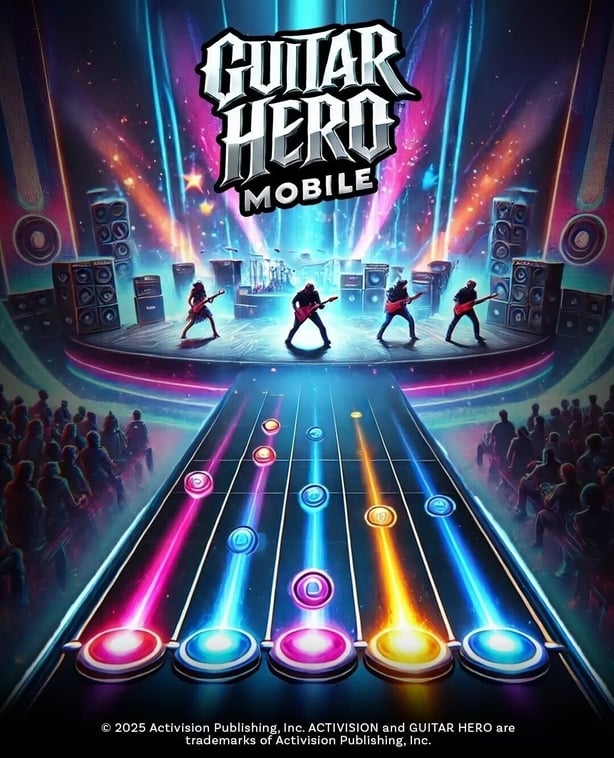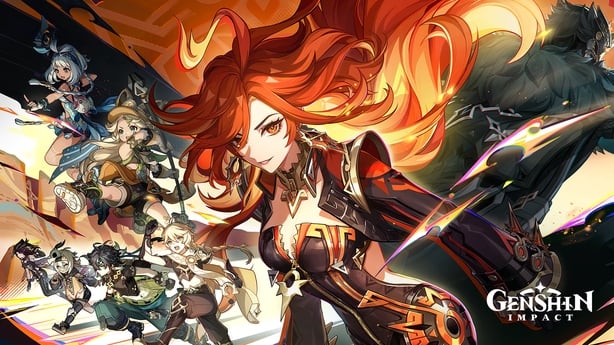Artificial intelligence - there is no escaping those two words now. Aimed at revolutionising life as we know it, AI technology works by simplifying trivial jobs, bypassing mundane tasks, and allowing us all to work smarter, not harder.
Sounds great, right?
Chances are you're either sitting near (or even wearing) a piece of tech currently using AI. And while you're using a program or watching a streaming platform, AI is working silently in the background to meet your needs in an instant.
But as the tech grows and becomes more prevalent, there are concerns about its use in creative industries, especially gaming. Generative AI (GenAI) is a strand of intelligence that generates new content based on existing materials.
Rather than taking over complicated systems like NPC behaviour or tracking in-game progress like AI has always done in gaming, GenAI is being used to create brand-new assets, including images, video, and audio in production.
The fear is that by recycling material in a split second, GenAI is becoming a major threat to the quality, originality, and standards of games we've come to expect.
Recent examples of GenAI are only fuelling the paranoia. Sloppy artwork, where characters have extra digits, and recycled voice lines are just two prime examples of a lack of human oversight in what has always been one of the most creative industries in entertainment.
In an era of chronic job losses across the sector, using existing content to inform future games (and bypassing artists, actors, and developers in the process) could be seen as making the situation worse.

Activision finally discloses using AI-generated content
Activision is no stranger to headlines. The behemoth publisher, which publishes popular series like Call of Duty and Overwatch, dominated headlines in 2023 when Microsoft acquired the company in a deal valued at over $68.7 billion.
A recent disclosure on the Steam page has propelled the company back into the newsfeeds of gamers worldwide. The problem arose on the storefront for their latest Black Ops 6 game, which has confirmed suspicions that the developers have, are, and probably will continue to use AI-generated content to make their games.
The line simply states: 'Our team uses generative AI tools to help develop some in-game assets,' with no real examples or specifics. However, this was enough to create a tsunami of criticism from gamers, who've had plenty of evidence to suggest that GenAI is being used to create their games.
No way these morons at Activision just dropped another too-many-fingers AI slop Call of Duty graphic LMAO pic.twitter.com/81rVgu3n6a
— Anthony (@notblametruth) December 7, 2024
Recently, characters have been found to have extra fingers in splash arts and load-outs. Weird rendering and misshapen lines also suggest recycled artwork on emblems. Mismatched colours point to a lack of quality controls.
You'd think that in a fast-paced game like Call of Duty, gamers wouldn't pay much heed to minor details - and yet, gamers are forensic when it comes to their favourite titles. No matter the game or the price tag, there is a certain standard gamers have learned to expect.
Content on keeping the controversy alive, Activision decided to post generative AI mockups of other games they wanted to gauge interest in on their social media recently. One such game that struck a nerve was Guitar Hero Mobile. When posted, it became a viral sensation in all the wrong ways.
Just a week after it admitted to using generative AI in Call of Duty: Black Ops 6 assets, Activision is accused of using it again in an Instagram ad for Guitar Hero Mobile, which may be a fake game being used to gauge user interest. https://t.co/fXUEO1TmcX pic.twitter.com/hWXl97egBu
— IGN (@IGN) March 3, 2025
All you need to do is zoom in on the image, and you'll see the inconsistent shapes, colours, and distortions across the board. And a sleuth of disappointed fans in the comments continue to ask why the billion-dollar company didn't simply hire someone to make the artwork instead.
Can AI 'make games great again?' Elon seems to think so
The idea that GenAI can, in some way, make games better is, in my view, bizarre. Like any profession, there is no substitute for the creativity, ingenuity, and commitment an artist, actor, or developer can bring.
Interacting with artwork created through a simple prompt feels cold and detached. AI struggles to count how many fingers a character should have—we don't need it to attempt to engage us on something.
And yet, there are plenty of big projects on the horizon, trusting it to deliver. Take Elon Musk, for example, who is no stranger to both the gaming industry and controversy.
Musk has already emphasized the need to combat the 'woke agenda' in gaming and take development away from 'massive corporations.' (It seems irony is not lost on the world's richest man.)
It's got to be done.
— Elon Musk (@elonmusk) February 17, 2025
Make video games great again! https://t.co/IyWQQQlVAF
To do this, he's unveiled plans to 'make games great again' through his company, xAI. Leveraging the chatbot Grok 3, there have already been examples of how developers might use Musk's GenAI technology to create (or recreate) games.
Examples include people constructing Space Invaders and Pac-Man in under 3 minutes. But now, recreating what we already have doesn't seem all that impressive. Aren't we just copying someone else's homework?
Elon's xAI Game Studio will revolutionize gaming.
— Min Choi (@minchoi) February 20, 2025
People are already generating games with Grok 3 in minutes.
And you can improve the graphics by just asking Grok.
10 games:
1. Pac-Man in p5.jspic.twitter.com/wWY0Agu9l2
But now, recreating what we already have doesn't seem all that impressive. Aren't we just copying someone else's homework? The fact remains that Musk has always been a tech disruptor. And his ambition is not to be overlooked. Giving people of any skill level access to these kinds of resources will undoubtedly have a massive effect on the wider industry. And he's not alone.
Microsoft's Muse – our answer to game preservation?
Microsoft has recently introduced the first 'World and Human Action Model' (WHAM). Nicknamed Muse, this GenAI can generate game visuals, controller actions, and more. It's aimed at empowering developers to predict and visualise gameplay – without needing a player.
An article explaining the technology states that Muse has been trained 'on more than 1 billion images and controller actions' from just one game, Bleeding Edge, which was released on Xbox in 2020.
My understanding is that developers can feed Muse a few moments of human gameplay, which it can then use to predict how players would react to new content. The idea is that developers can get insight into what a player might need and react accordingly without needing input or feedback from actual players. It seems even their role now seems to be under threat.

In a now-unlisted video explaining the technology, Xbox chief Phil Spencer said: "We definitely look at this work as a unique opportunity to kind of leverage the intersection of art and science, which is what video games are, to grow with the creator community, that's what these tools are about."
He also mentioned how Muse could be used for in-game preservation, where GenAI models could learn about older games through gameplay data alone. This, in turn, could recreate them on modern systems, thus keeping near-extinct games alive for future generations.
But looking through the comments posted, it doesn't matter how pure a goal the technology may have; a huge player base remains unconvinced. "I'm incredibly hesitant to advocate for this adoption when Publishers are doing everything they possibly can to 'downsize' the human talent," one user posts.
"What about having game developers make games instead? Stop the mindless AI peddling. Games should be made by real artists and professionals, not bots," another added. With comments like these, the decision to unlist the video is no surprise.

until the SAG-AFTRA video game strike is resolved
The future of the games industry
In 2024, an estimated 14,800 people were laid off in the gaming industry. This is despite many publishers reporting massive revenue increases. While the losses are credited as the fallout of the COVID-19 pandemic, GenAI could be just as devastating to workplace figures in the future.
Is that being too pessimistic? Perhaps.
But the fact remains that the technology is currently being used in some of the most popular games we all play. It affects the things we see, the voices and sounds we hear. Unfortunately, it also decides who will get paid for their work.
Call of Duty Black Ops 6 is just one example of GenAI backlash. The likes of League of Legends, Genshin Impact and Destiny 2 have had no English voiceover work on new content due to the SAG-AFTRA video game strike.
The newest patch for Genshin Impact is not fully voiced due to the strike and because Formosa is still being difficult with AI protection. Paimon's VA was moved to a different studio to get paid, and on time. If this continues, she may be the only EN voice in future updates pic.twitter.com/yjdkgjEPuV
— Daniel Alba 🌕 (@EvernightStudio) October 9, 2024
Actors want concrete assurances that their voices or likenesses will not be replicated through AI without consent or fair compensation. It's a worrying idea that the people who give us spellbinding performances or help design our favourite characters are potentially just one project away from making themselves obsolete for future content.
While artificial intelligence has always been a cornerstone of game creation, it's in generative AI that many are drawing a line in the sand. When it comes to the actual ideas being generated. The artwork is used to sell a story. The performances we want to fall in love with. Mechanics that could be the next big thing in the industry. Please let there be human imagination at the centre.
At the very least, until GenAI recognises that we only have five digits on one hand, I remain unconvinced it really knows what it's doing.

